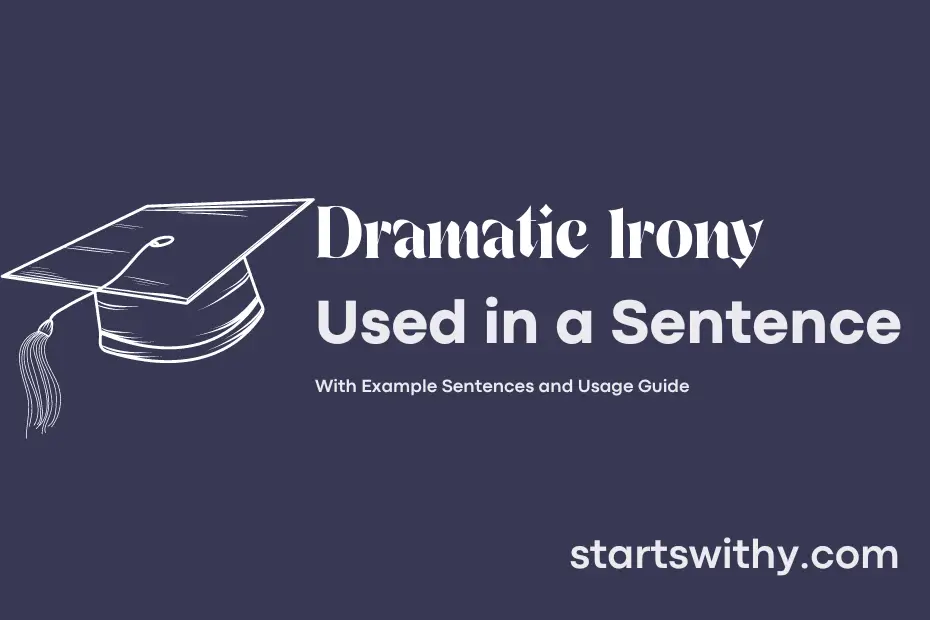Have you ever watched a movie where the audience knows something the characters do not? This storytelling technique is known as dramatic irony.
Dramatic irony occurs when the audience is aware of crucial information that the characters are oblivious to, creating tension and suspense as the storyline unfolds.
7 Examples Of Dramatic Irony Used In a Sentence For Kids
- The little mouse thought he was being quiet, but the cat heard every squeak.
- The young girl thought she had the biggest ice cream cone, but her brother’s was even bigger.
- The squirrel thought he had hidden all his nuts, but the bird found them on the tree.
- The frog believed he was disguised well, but the princess saw him hopping.
- The lion thought he was the strongest in the jungle, but the elephant trumpeted louder.
- The spider thought she had spun the best web, but the fly found a hole to escape.
- The bear thought he was the best at fishing, but the seal caught more fish.
14 Sentences with Dramatic Irony Examples
-
During a group project presentation, one student confidently says, “I did all the work myself,” but the audience knows they barely contributed anything.
-
A student tells their friend, “I studied all night for this exam,” not realizing their friend knows they were out partying.
-
The professor praises a student for their insightful analysis of a text, unaware that the student actually just read the Sparknotes.
-
A student confidently asserts in a debate, “I have never plagiarized in my life,” while the audience knows their last paper was copied from Wikipedia.
-
A student complains about never having enough time to study, ignorant of the fact that others know they spend hours scrolling through social media.
-
A student brags about acing a test without studying, unaware that their classmates saw them cheating.
-
A student proudly showcases their new designer bag without realizing their roommate knows they borrowed money to buy it.
-
A student shares their perfectly edited assignment not knowing their professor is aware they struggled with the topic.
-
A student talks about their stellar networking skills, unaware that others have witnessed them being shy and awkward at events.
-
A student boasts about their internship offer at a top company while their friends know they got the position through a family connection.
-
A student claims to have read all the required readings for class without realizing their professor knows they never opened the textbook.
-
A student talks about their healthy eating habits and daily workout routine, without knowing their roommate sees them binge on junk food and skip the gym.
-
A student confidently states they never miss a lecture while their friends remember seeing them skip classes regularly.
-
A student talks about being financially independent not realizing their parents have been secretly sending them money each month.
How To Use Dramatic Irony in Sentences?
Dramatic Irony is a literary device where the audience knows crucial information that the characters in a story are unaware of. This creates tension and suspense, as the audience anticipates the characters’ actions based on their lack of knowledge. To use dramatic irony effectively in a sentence, follow these steps:
- Establish dramatic irony by providing information to the audience that the characters do not know.
- Create a situation where the audience understands the true implications of the information but the characters do not.
- Use the information to build tension, suspense, or humor in the story.
- Ensure that the audience’s knowledge influences their perception of the unfolding events.
For example, in Shakespeare’s play “Romeo and Juliet,” the audience knows that Juliet is not really dead when Romeo finds her seemingly lifeless body. This creates dramatic irony as the audience watches Romeo’s tragic reaction, knowing that the situation could have been avoided. A sentence showcasing dramatic irony could be: “As she accepted his proposal, little did she know that he was planning a surprise birthday party for her the next day.”
By incorporating dramatic irony into your writing, you can engage your audience by allowing them to be one step ahead of the characters, enhancing the overall impact and depth of your story.
Conclusion
In literature, dramatic irony occurs when the audience or reader knows something that the characters in the story do not, creating tension and engagement in the narrative. This literary device allows for moments of suspense, humor, and tragedy as the audience anticipates the consequences of the characters’ actions. For example, in Shakespeare’s play “Romeo and Juliet,” the audience is aware of Juliet’s plan to fake her own death to be with Romeo, while Romeo believes she is truly deceased, leading to a tragic outcome.
Overall, dramatic irony serves to heighten the audience’s emotional investment in the story by providing them with privileged information that deepens their understanding of the characters’ motivations and the unfolding events. It adds layers of complexity to the storytelling, making for a more engaging and memorable reading or viewing experience.



